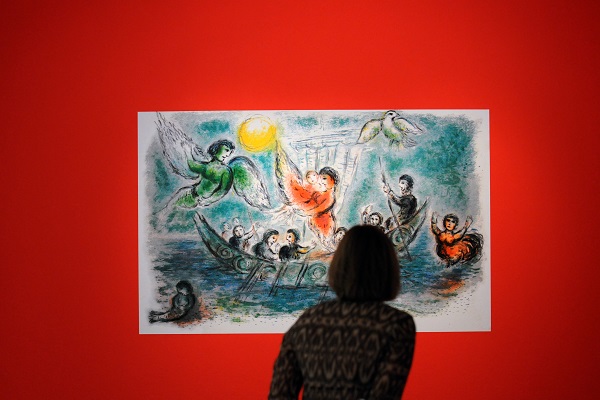From ‘Ulysses’ by Alfred, Lord Tennyson
Come, my friends,
‘Tis not too late to seek a newer world.
Push off, and sitting well in order smite
The sounding furrows; for my purpose holds
To sail beyond the sunset, and the baths
Of all the western stars, until I die.
It may be that the gulfs will wash us down:
It may be we shall touch the Happy Isles,
And see the great Achilles, whom we knew.
Though much is taken, much abides; and though
We are not now that strength which in old days
Moved earth and heaven; that which we are, we are;
One equal temper of heroic hearts,
Made weak by time and fate, but strong in will
To strive, to seek, to find, and not to yield.
Ulysses (or Odysseus as he’s known in Greek) is a character poets have loved to come back to time and again. He has been a wonderer across the centuries, a wily talker able to speak to each and every time and place. Each time he lands on the shores of a new century Ulysses effortlessly changes his garb to… well, to not quite fit in. Because that’s the point. Homer’s Odysseus eventually gets home, but almost all the writers who’ve imagined him since have been interested in the idea of a man who can no longer feel at home – especially when he’s actually there.
I’m going to take a look at Tennyson’s Ulysses as one of a long line of homeless misfits. We’ll come to versions by Byron and Joyce later, but our starting point is Dante. He lived at a time when the Odyssey was unknown in Western Europe, but knew of Ulysses from Virgil and other sources. He imagined him as a man with an insatiable thirst for honour and knowledge and has him drown on a final voyage beyond the bounds of the known world.
We meet a similar Ulysses in Tennyson’s poem. He is speaking on Ithaca, the island he rules and shares as home with his wife Penelope. But all is not right. Here’s how the poem begins:
It little profits that an idle king,
By this still hearth, among these barren crags,
Matched with an aged wife, I mete and dole
Unequal laws unto a savage race,
That hoard, and sleep, and feed, and know not me.
What exactly is the problem? Ulysses calls himself an ‘idle king’, but almost immediately speaks of administering the law. He may be disparaging about the ‘unequal laws’ and ‘savage race’ of his kingdom, but he is still doing the things a king ought to do. Perhaps what Ulysses says next is the real source of his unease:
I cannot rest from travel: I will drink
Life to the lees.
Ulysses has come to think of himself as someone who devours experience, someone ‘always roaming with a hungry heart’. This is the real reason that he cannot feel comfortable resting on an island with people who ‘hoard, and sleep, and feed’, more like animals than the restless intelligence which he has become.
The Ithaca Ulysses has returned to is no longer the Ithaca he left because he is no longer the man who left it:
all times I have enjoyed
Greatly, have suffered greatly.
When he knew nothing else he could happily perform the functions of an island king in the same way that animals naturally do the things that are in their nature. But now he sees Ithaca as one place amongst many, and his way of life there one life amongst many. And he can’t help but ask himself – ‘why here? why not there?’
The more we know of the world, the more likely we are to ask ourselves these kind of questions about the way we do things. The literature of the last two hundred years is full of people who feel like this. Byron’s Don Juan, for example, wonders around the Mediterranean (and much of Europe) just like Homer’s Odysseus. He undergoes a sequence of arbitrary adventures punctuated with episodes of redemptive love and self-sacrifice, but he doesn’t seem more at home in any one place than in any other. His world is a bewildering stage where things just happen. Leopold Bloom, in James Joyce’s Ulysses, is an Irishman whose father was a Hungarian Jew. He is doubly an outsider, knowing almost nothing of his neighbours’ Catholicism but equally distant from the faith of his father. ‘What is your nation?’, he is asked by a suspicious Irish nationalist.
Byron, Tennyson and Joyce give us three different Ulysses who all find that it’s hard to feel properly at home. Byron gives us a hero who shrugs his shoulders, tastes all life has to offer, and looks for no great meaning beyond the glorious bursts of thoughtless human love which wash over him. Tennyson’s Ulysses, on the other hand, looks to himself for something solid. If Ithaca no longer underpins his sense of how he belongs in the world, at least he can focus on his own indomitable will ‘to strive, to seek, to find, and not to yield’. Leopold Bloom offers a humane mix of the two. At the end of Ulysses he returns home to his wife Molly. He knows she’s having an affair and that her lover visited her that afternoon. But it seems he’s come to terms with that and still loves her (even though he’s conducting his own intrigue). Through a mixture of charity towards others and sheer muddling through, he manages to keep his home together. He even does the cooking. I know which one is my hero.






Comments